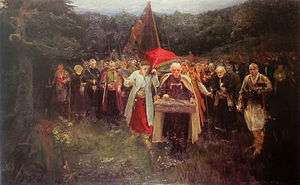Kosh otaman

Kosh otaman (Ukrainian: Кошовий отаман, Koshovyi otaman; Russian: Кошевой атаман, Koshevoy ataman; Polish: Ataman koszowy; also known as Koshovyi of the Zaporizhian Host) was a chief officer of the Kosh (military society) of the Zaporozhian Host in the 16th through 18th centuries.
Overview
The otaman was elected by a council of elder officers (the starshyna) of the Zaporozhian Host.[1] The position contained the highest military, administrative, and judicial powers. Until the establishment of the Cossack Hetmanate the title was interchangeably used with Hetman. During military campaigns, powers of an otaman were virtually unrestricted, but in peacetime he addressed the most important military and political issues he addressed to the starshyna and other military councils. A Kosh otaman was elected for a term of one year and in exceptional cases was reelected. Upon expiration of his term amounted to report on his activities to a military council. The Kosh otaman that was not re-elected returned to his assigned kurin.
Duties
- Open military councils (circle)
- Headed starshyna councils
- Enter diplomatic relationships with foreign countries
- Distribute military trophies
- Distribute profit from customs
- Legitimize the division of pastures, estates, and land for hunting and fishing
- Confirm the Kosh starshyna elected by the Sich council
- Appointed palanka and other starshynas and sometimes military servicemen
- Acting as supreme judge asserted the sentences made by a Kosh judge
- Accepted clergymen from Kiev and appointed priests to the churches of Sich and palankas
- During his absence appointed a nakazny otaman (appointed otaman) as his deputy
In 1723, this rank was depreciated with the nomination of an nakazny otaman (Наказний отаман, 'appointed' or 'acting otaman') by the Tsar of Russia. Among most famous Koshovyi otamans were Ivan Pidkova, Ivan Sirko, Petro Kalnyshevsky, and others. There were at least 30 Kosh Otamans in the history of Zaporizhian Sich before its collapse in 1775. Nothing is known about the Kosh Otamans of Tomak Sich, Bezlavuk Sich, and Mykytyn Rih Sich. The longest standing Sich was the Chortomlyk Sich of which most of information has survived. After the defeat at the battle of Poltava and the Sich raid Kost Hordiyenko transferred the Sich downstream along Dnieper to the old settlement of Oleshky in 1709, which was part of Ottoman Empire. It took some 25 years before the Russian government allowed for Cossacks to return to reestablish the New Sich by Ivan Malashevych. With the destruction of Sich in 1775 Zaporizhian Cossacks have moved to Danube Delta.
References
External links
- Kish Otoman in the Encyclopedia (in English)